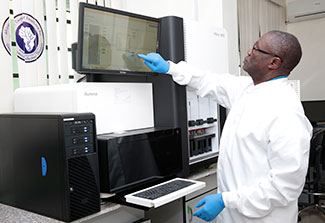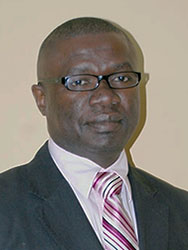Former Fogarty grantee leads COVID-19 genomics work in Africa
May / June 2020 | Volume 19, Number 3
Q and A with Fogarty, NIH grantee Christian Happi, M.Sc., Ph.D.

Photo courtesy of Dr. Christian Happi
Dr. Christian Happi is director of the African Centre of Excellence for the Genomics of Infectious Disease, and professor of molecular biology and genomics at Redeemer's University in Nigeria. A leading genomic sequencing expert, Happi is also a visiting scientist at Harvard University. His first NIH grant was a Fogarty International Research Collaboration Award (FIRCA) and he is now a Principal Investigator on the NIH’s
Human Heredity and Health in Africa (H3Africa) project. He has won numerous honors for his accomplishments, including the 2019 African Prize from the Human Genome Organization.
How did Fogarty help advance your career?
Being named collaborator on the Fogarty grant in 2004 was the most critical step on my career path and laid the groundwork for my research achievements so far. My mentor, Dr. Dyann F. Wirth at Harvard, gave me responsibility to manage the whole project and report to her if there were challenges. Her words still ring in my ears like yesterday: “If you are successful with this, it will be the beginning of a brilliant career. The ball is in your court and you cannot afford to fail me.”

Christian Happi, MSc, PhD
In 2008, I was promoted to Principal Investigator when the grant was renewed. This experience helped me become an independent investigator and further strengthened my capacity and abilities to manage research projects.
You initially studied malaria. Why was that?
It was a childhood dream for me to solve malaria, since I had multiple malaria episodes growing up. I made significant breakthroughs - from unravelling molecular markers of resistance to many antimalarial drugs, to using my genomics data to influence evidence-based antimalaria drug policy change in Nigeria. More importantly, building capacity on the African continent in the field of malaria molecular biology was most rewarding, because I can see today that many of the young African scientists that we trained are now among the leaders of malaria research across the continent.
How did you become engaged with Ebola?
In 2013, I received an NIH grant that was critical for the establishment of the first infectious disease genomics platform in West Africa, the African Center of Excellence for Genomics of Infectious Disease (ACEGID), at Redeemer's University in Nigeria. While we were doing our work on Lassa fever in 2014, we were faced with the largest Ebola outbreak in West Africa. We soon diagnosed the first case of Ebola in Sierra Leone and started working with government officials, offering diagnostic support. More importantly we quickly sequenced 99 genomes and made them available to the international research community for the development of various countermeasures.
We pioneered open data access for outbreak response and are happy that has now become the standard. We have established sequencing facilities in Nigeria, Sierra-Leone, Senegal and Liberia that have been used to respond to many outbreaks of diseases such as Lassa fever, monkeypox and yellow fever. We also have over the years built a critical mass of over one thousand well-trained African genomics scientists that are currently leveraging the skills acquired and the facilities we have established.
How did that prepare you for COVID-19?
Our work on Ebola gave us the confidence that we could sequence any organism, including the human genome. We had established a very robust metagenomic platform that enabled us to sequence the whole genome of the first SARS-CoV-2 in Africa from the
first index case in Nigeria within 48 hours of receiving the samples. We realized that the whole genome sequencing and analytical pipelines that we set up for Ebola work seamlessly for SARS-CoV-2. The sequence provided us with the origin of the virus and enabled us to have better insight into the virus structure.
The significance of our work is that through what we are doing, we have put Africa on the map, by contributing knowledge and information to global sequencing data repositories. We have changed the narrative by shifting our status from genomics knowledge consumers to genomics knowledge producers.
How has H3Africa advanced genomics capacity?
Genomics has become a critical component of infectious disease research, control and eradication. It provides both the researchers and policymakers with the type of insight and scientific evidence that they will not ordinarily have for public health interventions. It is important for Africa to have its own biobanks and genomics capabilities because with these, we will be able to adequately address health issues that are important to Africa. H3Africa has been a catalytic force for the successful establishment of state-of-the-art laboratories and biobanking facilities on the continent.
More Information
To view Adobe PDF files,
download current, free accessible plug-ins from Adobe's website.